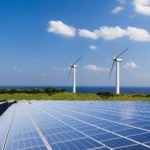BBVA secures nearly €12 billion in sustainable financing in 2018
BBVA secured €11.8 billion in sustainable financing in 2018, the first year of Pledge 2025, the bank’s initiative to combat climate change. This figure includes transactions in green financing (69 percent of the total), sustainable infrastructure and agribusiness (13 percent), and social entrepreneurism and financial inclusion (18 percent).

As BBVA Executive Chairman, Carlos Torres Vila, reminded those at the annual shareholder meeting, BBVA has “committed to securing €100 billion through 2025 for the purpose of fighting climate change.” BBVA has become the world leader in sustainable loans and the most active Spanish bank in issuing green and social bonds.
On February 28, 2018, BBVA announced Pledge 2025, its resolute commitment in the fight against climate change. With this initiative the bank contributes to the United Nations Sustainable Development Goals and has aligned itself to the Paris Agreement. Just over a year later, this important commitment has been embraced by the bank’s customers who “increasingly appreciate this type of financing and turn to us as leaders in the market,” Carlos Torres Vila pointed out in the annual general meeting on March 15.
“We are facing significant environmental challenges such as the fight against climate change, the loss of biodiversity, the overexploitation of resources, the depletion of freshwater, and the pollution of our air and oceans, all of which demand more responsible production and consumption,” he explained to the shareholders. According to BBVA's Executive Chairman “The challenges for a more sustainable future are global by nature and require everyone’s involvement, including banks, as important players in society. The future of banking is in financing the future, a future that is at the front and center of everything we do.”
Pledge 2025, which aims to gradually align BBVA's business activities with the fight against global warming and to strike the required balance between sustainable energy and fossil fuel investments, is based on three lines of attack: financing, management, and engagement.
"The bank’s customers increasingly appreciate this type of financing and turn to us as leaders in the market”

The bank has updated its policy on financing for industries with significant environmental and social impacts.
Financing
With respect to Pledge 2025’s first tactic, BBVA has continued to use its knowledge, skill, and experience in order to provide its customers with superior advice on sustainable financing solutions, and it has emerged as the leader in green loans and financial products.
BBVA has been a pioneer and the dominant player in the sustainable loan business. Today it is on the world stage as one of the most active organizations in the field, and the indisputable leader in Spain and Italy. In the past two years, the bank has led a total of 30 deals in Europe and the Americas for clients in various sectors, and it is the organization that has most frequently assumed the role of either sustainability coordinator or agent.
2018 has proven to be the year when green, social, and sustainable bonds have come into their own and taken hold. As an issuing bank, BBVA approved its framework for issuing green bonds tying it to the United Nations SDGs. It successfully issued the inaugural green bonds for BBVA and BBVA Bancomer (Mexico) and the first bond of this kind for Garanti in Turkey. As a structuring bank and underwriter, BBVA has secured a leading position in the market, acting as the bookrunner in 13 deals.
Last year the bank went even further with its goal of supporting its corporate clients with their sustainable financing strategies by offering them not only long term financing products like bonds and loans, but also giving them the alternative to adopt short and medium term sustainable financing solutions. To achieve this, the bank developed a sustainable transactional product framework that is linked to the United Nations SDGs. This initiative is unprecedented in the industry. The new methodology facilitates the classification of its customers’ transactional banking operations designating them green, social, or sustainable.
For its part, the BBVA Microfinance Foundation (BBVAMF) continues in its efforts providing beneficial financing in Latin America to promote sustainable economic and social development, which is also inclusive of vulnerable people. In 2018, it benefited more than two million customers, 57 percent of whom were women, which directly contributes to the reduction of gender inequality. Furthermore, it allocated €1.3 billion in microcredits in 2018, with an average total of €1,134 per microcredit.
"The future of banking lies in financing for the Future, Future with a capital F"

BBVA has committed that by 2025, 70 percent of the energy the Group contracts will be renewable, reaching 100 percent by 2030.
Management
To touch on BBVA's second line of action in managing environmental and social risks, the bank has updated its policy on financing for industries with significant environmental and social impacts. The main change is tougher, tighter restrictions for the mining, energy, infrastructure, and agribusiness industries. The policy provides clear guidance on the processes for managing clients and business dealings within these sectors. The transportation of tar sands (crude bitumen) has been explicitly added to the list of prohibited activities.
With regard to the management of climate risks, BBVA made progress in the assessment of risks associated with climate change as per recommendations made by the Task Force on Climate-related Financial Disclosures (TCFD). It also undertook work to apply the PACTA methodology, which assists with the verification of the degree of alignment with the Paris Agreement for loan portfolios in the most relevant sectors.
The transportation of tar sands (crude bitumen) has been explicitly added to the list of prohibited activities
In its efforts to reduce the direct environmental impact of its business activity, with the Pledge 2025 framework BBVA has committed that by 2025, 70 percent of the energy the Group contracts will be renewable, reaching 100 percent by 2030. Additionally , the bank will reduce its CO2 emissions by 68 percent from its 2015 levels. Using data through December 2018, the bank has already reduced its CO2 emissions by 30 percent since 2015, and 35 percent of the energy it consumed came from renewable sources. The bank also recently announced its power purchase agreement with Endesa, which will allow BBVA to source power from its own wind farm.
Engagement
As part of the third tactic of its pledge, BBVA actively participates in the most important international sustainable development initiatives such as the United Nations Global Impact, the Equator Principles, the United Nations Environment Programme - Finance Initiative (UNEP FI), the Carbon Disclosure Project, the Thun Group (an informal group of banks that share experiences about applying the UN’s Guiding Principles on Business and Human Rights to banking activities).
During 2018, BBVA was one of 28 banks from around the world that participated in the creation of the Principles for Responsible Banking, presented this year in Paris. It was also one of the banks that signed a letter to the world leaders and heads of state attending the United Nations climate change summit in Katowice (Poland). In the letter, the banks committed to financing and designing the financial services necessary in order to support their clients during the transition to a low carbon economy.
Furthermore, the the bank is an active contributor to numerous international forums on sustainable development due to its role as the European banking representative on the Global Steering Committee of the UNEP FI Sustainable Finance Forum and holding the presidency of the European Banking Federation’s sustainable finance working group. Additionally, in 2018 the bank held the first BBVA Sustainable Finance Forum in its headquarters in Madrid, an event that brought together investors, business people, public and private sector representatives, and experts in sustainable finance in order to promote the role of the financial sector in sustainable development and the fight against climate change.